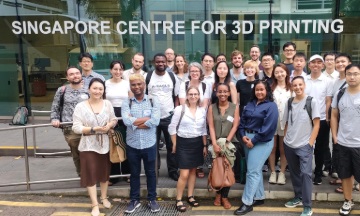NTU Singapore and MAHA Chemicals (Asia) collaborate on Projection Micro Stereolithography research
-collaborate-on-projection-micro-stereolithography-research.jpg?sfvrsn=cbdf91e2_1)
(from left) Mr Shum Chee Wai, Dr Herng Tun Seng, Assist Prof Huang Hen Wei (Project PI, SC3DP), Professor Paulo Bartolo (Executive Director, SC3DP), Mr Chew Chin Seong (Managing Director of Maha Chemicals), Ms Tan Seow Hoon (Founder of Maha Chemical), Dr Ng Yean Thye (Project PI, Maha Chemicals), Mr Clarance Tan (Maha Chemicals)
The Singapore Centre for 3D Printing (SC3DP) at Nanyang Technological University (NTU), Singapore, has embarked on an exciting collaboration with Maha Chemicals (Asia) Pte Ltd to revolutionise the manufacturing of micro-devices. This joint lab initiative, titled "Feasibility Study for Scalability of PμSL (Projection Micro Stereolithography) for Next-Generation Manufacturing of Micro Devices," was officially formalised with an agreement signed on 12 September 2024.
PμSL is a cutting-edge additive manufacturing technology known for its ability to produce highly detailed micro-scale objects with remarkable precision. Utilising UV light to cure photopolymer resin layer by layer, PμSL has shown immense potential in microelectronics, biomedical engineering, microfluidics, etc. However, its adoption in large-scale manufacturing has been limited by challenges related to speed, material selection, cost-effectiveness, and scalability. This collaboration seeks to overcome these obstacles, paving the way for broader industrial applications.
Through this initiative, SC3DP and Maha Chem aim to push the boundaries of PμSL technology by focusing on three key pillars: People, Demonstration, and Development. The People pillar will encompass workshops, seminars, and training sessions to encourage the adoption of PμSL technology among faculty members, PhD students, and industry professionals. The Demonstration pillar will develop case studies in collaboration with NTU students, with findings to be presented at major conferences. Finally, the Development pillar will focus on optimising the technology for future applications.
The primary objective of this feasibility study is to assess the technical and economic viability of scaling up PμSL for micro-device manufacturing. Specific goals include evaluating the current state of PμSL, identifying necessary advancements for large-scale implementation, and conducting a cost-benefit analysis to determine its economic feasibility. The study will also explore potential industrial sectors that could benefit from this technology.
The partnership between SC3DP and Maha Chem represents a significant step forward in additive manufacturing research. By addressing the challenges of scaling PμSL technology, this collaboration has the potential to transform the production of micro-devices, making high-precision manufacturing more accessible and efficient across various industries.














/enri-thumbnails/careeropportunities1f0caf1c-a12d-479c-be7c-3c04e085c617.tmb-mega-menu.jpg?Culture=en&sfvrsn=d7261e3b_1)

/cradle-thumbnails/research-capabilities1516d0ba63aa44f0b4ee77a8c05263b2.tmb-mega-menu.jpg?Culture=en&sfvrsn=1bc94f8_1)






